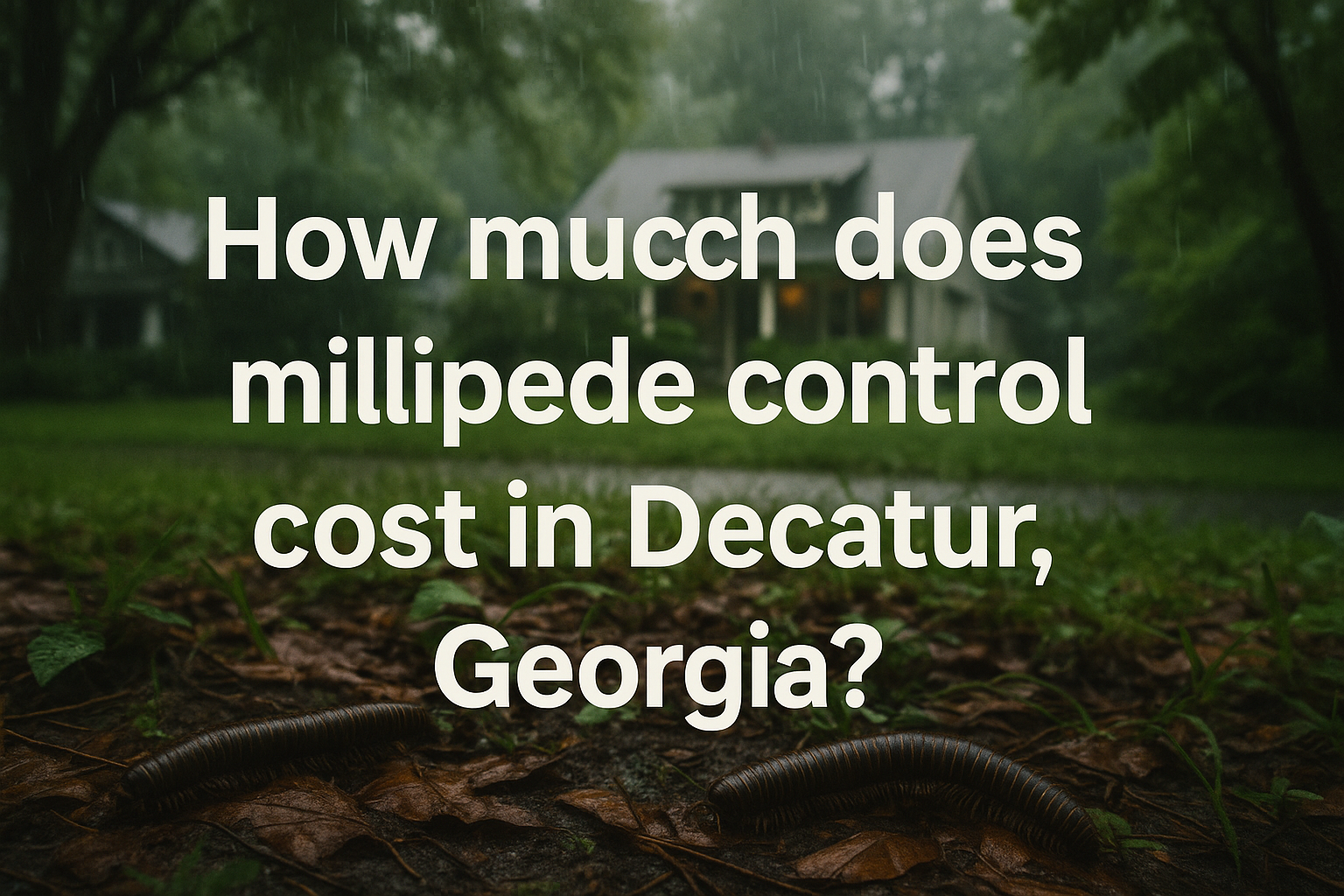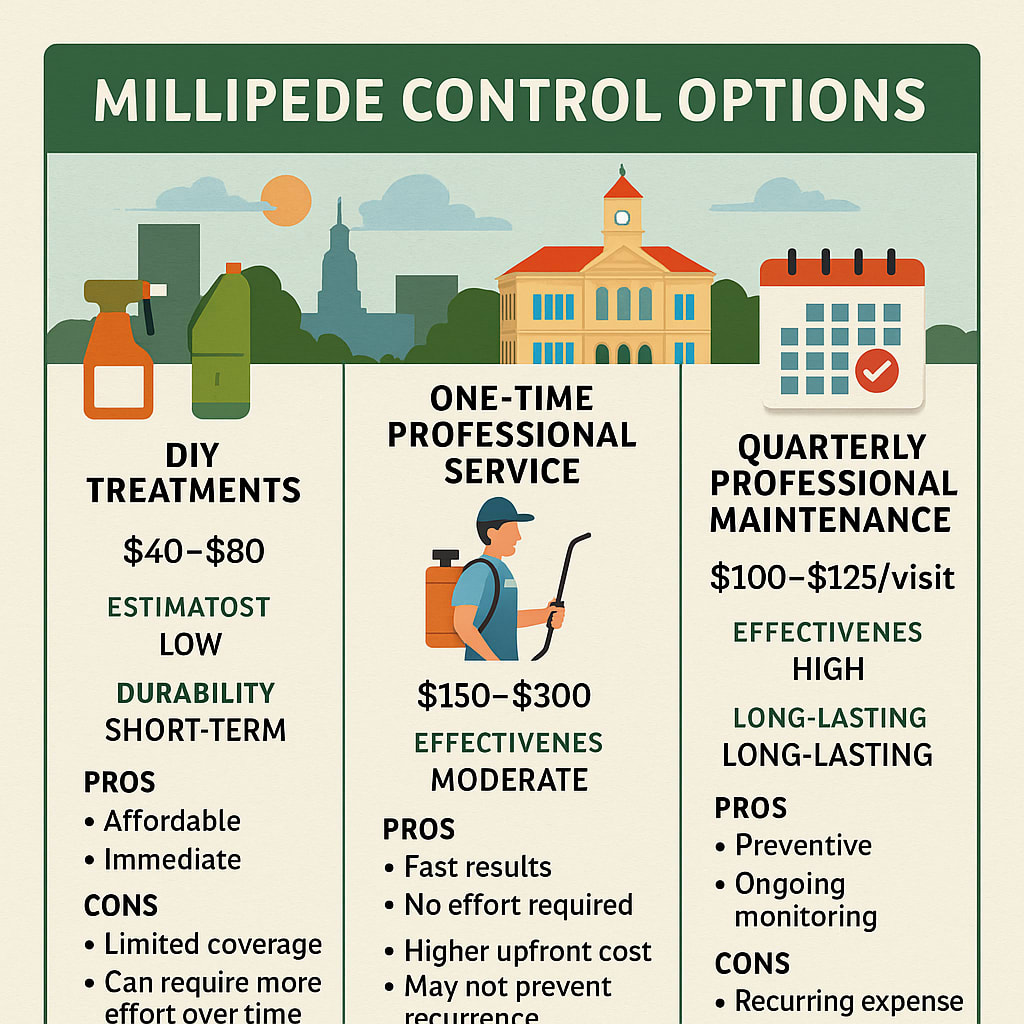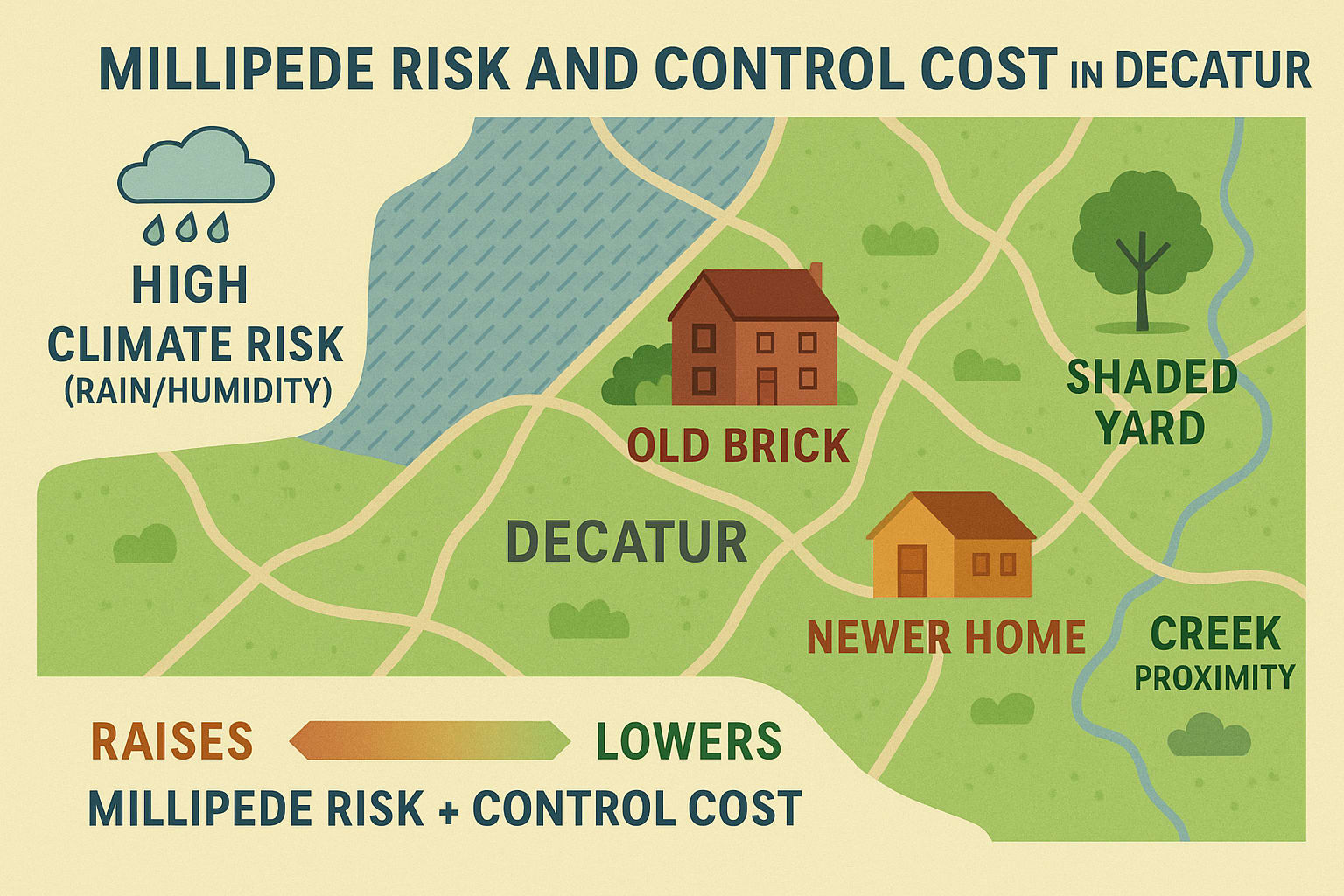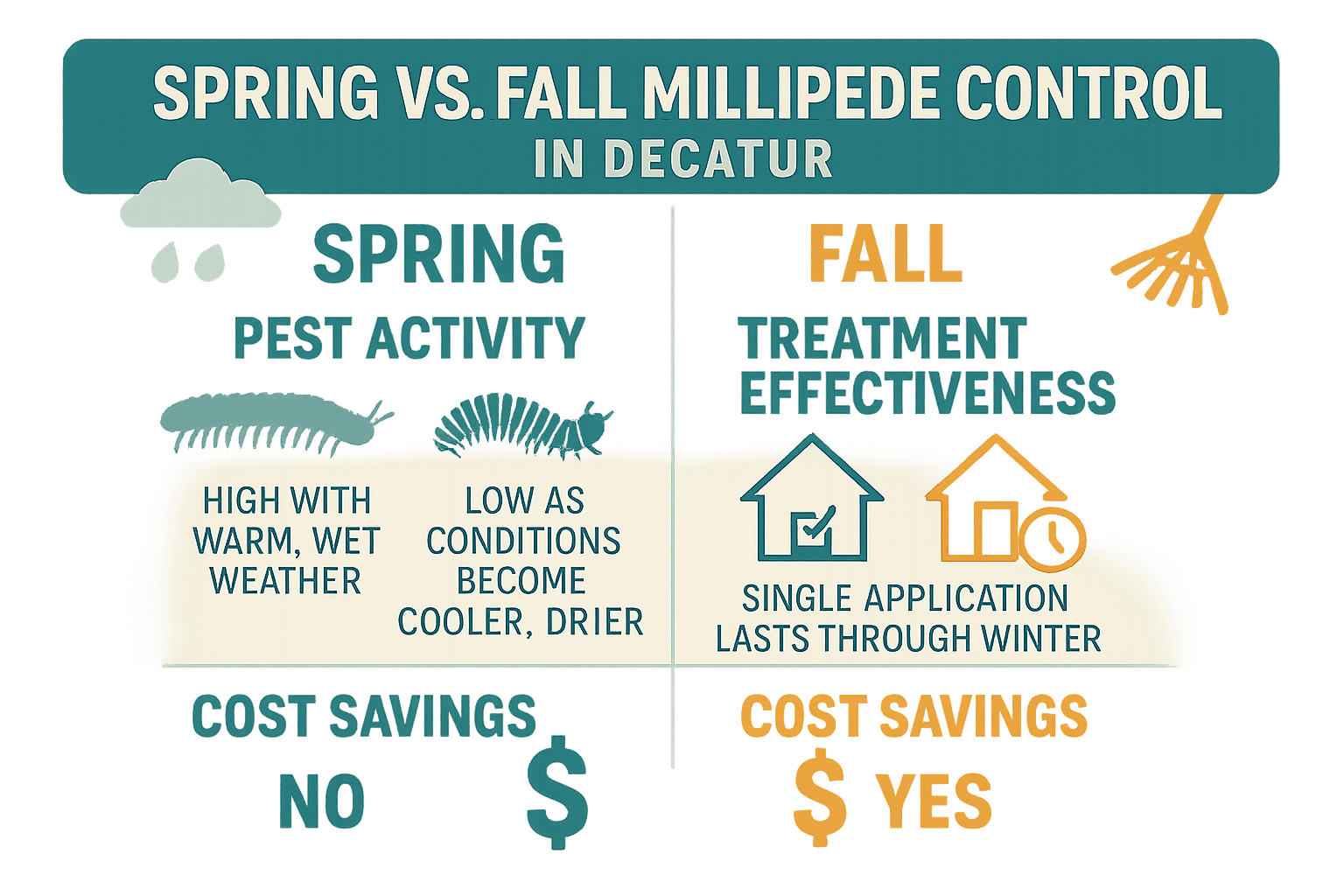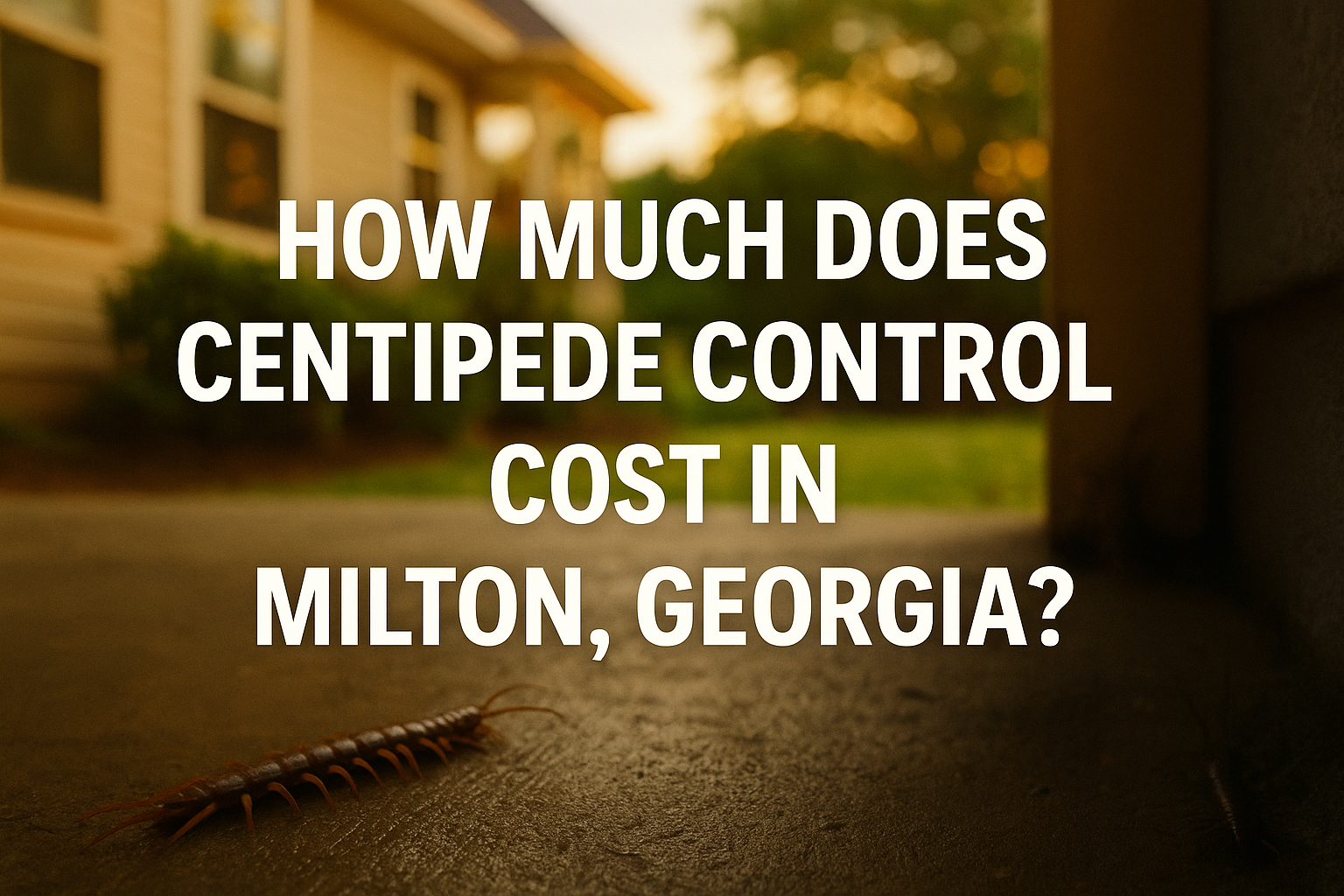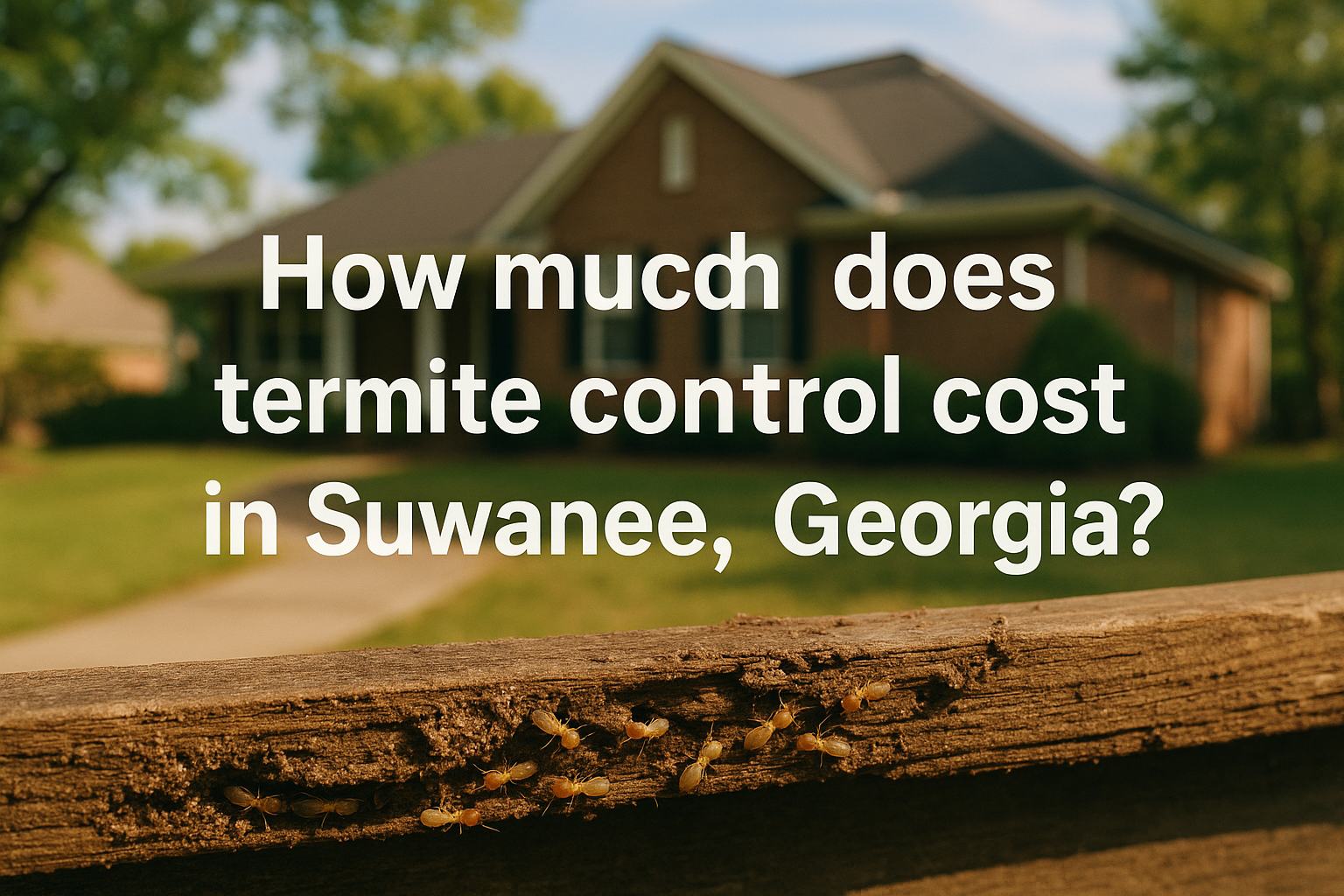Why Millipedes Are Crawling Into Decatur Homes
Living in Decatur, you already know how thick the air can feel during our humid, rainy seasons. But did you know all that moisture also inspires millipedes to head indoors? If you’re finding small, dark, worm-like critters curling up in your basement, bathroom, or even laundry room, you’re not alone—millipede problems are a regular headache for homeowners here. Many residents even start searching for millipede control cost Decatur estimates once infestations pick up, since prevention and early treatment can save both time and money.
It’s especially true in neighborhoods that celebrate mature trees and shady yards, like Oakhurst, Winnona Park, and Glennwood Estates. All those older homes and lush gardens create the perfect environment for millipedes. These pests tend to move inside when their natural outdoor spots get either too soggy or too dry, seeking refuge where it’s cool and damp. Basements, crawlspaces, and ground-level rooms are their favorites, turning your peaceful retreat into bug central almost overnight.
Let’s be honest: spotting millipedes skittering across the floor isn’t just gross, it’s a real worry. While they don’t bite or spread disease, you don’t want them making themselves comfortable—especially not in droves. That’s where professional millipede control steps in. A first visit from a pest pro in Decatur usually runs between $150 and $300. For ongoing peace of mind, quarterly follow-ups typically cost $100 to $125 per visit. Since homeowners often ask about the average millipede control cost Decatur services provide, it’s important to note that pricing depends on factors like how bad the infestation is, how large your home is, and its overall layout.
Before you make a decision or reach for the phone, it pays to know what’s driving those costs—and which prevention techniques actually work. Understanding your options is the key to keeping your home safe without overspending. In this guide, you’ll find everything you need about what affects millipede treatment prices in Decatur, plus practical steps that help keep your place pest-free year-round. If you love your home and your peace of mind, you’re in the right place—let’s break down all you need to know.
What Shapes the Cost of Millipede Control in Decatur
Let’s break down what really goes into the price when you’re tackling a millipede problem in Decatur. The first thing we look at is how big your issue actually is. If those critters are just spotted in one room, that’s a different ballgame (and budget) than if you’ve got them streaming out of a damp basement or crawling along the entire foundation of your house. Since the average millipede control cost Decatur homeowners face depends heavily on infestation size, understanding the scale of the problem is the first step in figuring out a realistic budget.
It’s not just about numbers—severity and urgency play a huge role. Say you live in a bigger historic home in MAK Historic District or have a basement-level family room over in Medlock Park. When millipedes show up there, it often means extra visits, targeted treatments, and sometimes bigger efforts to keep them from coming back. Fast infestations, or ones that keep spreading, tend to be more expensive simply because they take more time and muscle to get under control.
The method of control is another big factor. For some spots, a quick application of a chemical barrier might do the trick. For others, especially if you want to avoid harsh chemicals or you need a longer-term solution, integrated pest management (IPM) plans or hands-on exclusion work—like sealing up entry points and fixing foundation gaps—can drive up the cost a bit. These solutions are more thorough, but they’re also more labor intensive.
The age, type, and layout of your property matter, too. Older brick homes, especially those with multiple stories, tend to have more cracks and crevices where millipedes can sneak in. That means treatments might need to be more extensive. Newer ranch homes may be easier to seal up and treat, but every property has its own quirks, so there’s rarely a one-size-fits-all approach.
To give you a ballpark, most homeowners in Decatur pay somewhere between $150 and $300 for the first service, depending on the situation. After that, keeping things under control typically takes seasonal (quarterly) treatments, which usually run between $100 and $125 each time. When looking at the millipede control cost Decatur residents often face, these numbers can shift if there are added complications—like an infestation involving more than just millipedes, or if you need major exclusion work such as custom sealing around foundations or basements. In those cases, the overall cost can rise a bit higher.
If you ever feel like you’re spending too much time chasing millipedes across your floors, it’s worth an inspection and a custom plan—no two homes in Decatur are exactly alike, and you deserve a solution that fits both your house and your budget.
What Shapes the Cost of Millipede Control in Decatur
Let’s break down what really goes into the price when you’re tackling a millipede problem in Decatur. The first thing we look at is how big your issue actually is. If those critters are just spotted in one room, that’s a different ballgame (and budget) than if you’ve got them streaming out of a damp basement or crawling along the entire foundation of your house. When evaluating the millipede control cost Decatur homeowners typically encounter, the scale of the infestation plays one of the biggest roles in determining the final price.
It’s not just about numbers—severity and urgency play a huge role. Say you live in a bigger historic home in MAK Historic District or have a basement-level family room over in Medlock Park. When millipedes show up there, it often means extra visits, targeted treatments, and sometimes bigger efforts to keep them from coming back. Fast infestations, or ones that keep spreading, tend to be more expensive simply because they take more time and muscle to get under control.
The method of control is another big factor. For some spots, a quick application of a chemical barrier might do the trick. For others, especially if you want to avoid harsh chemicals or you need a longer-term solution, integrated pest management (IPM) plans or hands-on exclusion work—like sealing up entry points and fixing foundation gaps—can drive up the cost a bit. These solutions are more thorough, but they’re also more labor intensive.
The age, type, and layout of your property matter, too. Older brick homes, especially those with multiple stories, tend to have more cracks and crevices where millipedes can sneak in. That means treatments might need to be more extensive. Newer ranch homes may be easier to seal up and treat, but every property has its own quirks, so there’s rarely a one-size-fits-all approach.
To give you a ballpark, most homeowners in Decatur pay somewhere between $150 and $300 for the first service, depending on the situation. After that, keeping things under control typically takes seasonal (quarterly) treatments, which usually run between $100 and $125 each time. When looking at the millipede control cost Decatur residents face, these averages can shift higher if complications arise—like an infestation involving more than just millipedes, or if you need major exclusion work such as custom sealing around foundations or basements.
If you ever feel like you’re spending too much time chasing millipedes across your floors, it’s worth an inspection and a custom plan—no two homes in Decatur are exactly alike, and you deserve a solution that fits both your house and your budget.
How Decatur’s Homes and Weather Impact Millipede Problems
Living in Decatur means dealing with hot, humid summers and the kind of rainstorms that make everything feel a bit swampy—perfect conditions for millipedes to invade. When the clouds open up in spring and summer, all that moisture can push these critters right into your living spaces, especially if your home has an unfinished basement or was built before tight sealing around foundations became standard practice.
It’s more than just the age of the house, too. If your home in neighborhoods like Great Lakes or Chelsea Heights features wood siding, crawl spaces, or even just a lot of beautiful, shady trees, you might be rolling out the welcome mat for millipedes without even knowing it. All that lush landscaping may look great, but thick mulch beds and deep shade trap moisture around your foundation, making it easy for pests to sneak inside for shelter.
Another thing folks often don’t consider is what’s happening below ground. The type of soil around your property, especially if you’re near a creek bed or an area with poor drainage, can keep the ground damp for days after a rain. That extra moisture gives millipedes a place to thrive outdoors—and when it gets too wet out there, they’ll try their luck indoors.
The bottom line? The overall structure and maintenance of your home, plus the landscape and even your street, play a huge role in both how often millipedes show up and what it takes to get rid of them. If you’re in one of Decatur’s older neighborhoods or just have a yard packed with greenery, expect that treatments might be needed more frequently, and sometimes at a slightly higher cost. Staying on top of repairs, moisture management, and landscaping can help reduce both the hassle and the bill when it comes to millipede control.
Make Your Home a Millipede-Free Zone
If you want millipedes to find somewhere else to crawl, it’s all about making your home less inviting. Start by keeping those gutters clear and make sure water is draining away from your foundation—not pooling right up against it. Too much moisture is practically an open invitation to these critters. In Decatur, where humidity isn’t shy, running a dehumidifier in your basement or crawl space can really tip the odds in your favor.
Next, walk the outside of your house and take a good look: check for gaps, cracks, or little crevices, especially around doors, windows, and your home’s foundation. Sealing up these entry points and fixing damaged screens goes a long way. You’d be surprised at how many millipedes sneak in just because the mesh is torn or a door seal is missing.
Take a look at your landscaping, too. Try to keep mulch, leaf piles, and wood just a few feet away from your foundation—millipedes love hiding in damp, organic material. In Decatur’s famously lush neighborhoods, a tidy yard isn’t just about curb appeal—it’s your secret weapon for pest control.
- Keep gutters and downspouts clear and functional
- Run dehumidifiers in damp areas
- Seal cracks or gaps in your home’s exterior
- Repair or replace damaged window and door screens
- Keep mulch, leaves, and wood piles away from your foundation
And here’s a tip: do a quick inspection each spring and summer, since that’s millipede season here. Spotting trouble early saves you money down the line. Annual checkups from a local Decatur pest control pro are worth it—even if you’re already tackling things on your own. Prevention is always cheaper than dealing with an invasion!
Don’t Wait Until Millipedes Are Marching Inside
Here in Decatur, you’ll see way more millipedes popping up after a few good spring rains or when humidity climbs in early summer. That’s when these critters come out looking for cool, damp spots—meaning your yard, basement, or crawlspace could turn into a millipede hotspot overnight. If you want to keep things easy and less expensive, getting a handle on millipede control before the season kicks into high gear is the way to go.
A lot of smart homeowners in spots like Winnona Park or Decatur Heights circle March and April on the calendar. Booking a proactive treatment during late winter or early spring gives you a real shot at stopping millipede activity before it even gets going. Plus, pest control pros often run off-season deals, so you could save some cash getting ahead of the rush.
If you’re already spotting millipedes indoors or gathering along the foundation, don’t wait—jump on it right away. An active infestation can get out of control fast, and waiting too long means more headache and usually bigger costs down the road. Since the millipede control cost Decatur homeowners pay often rises with the size and urgency of the problem, tackling it early helps you save money and stress. Here’s a quick guide for Decatur folks to get the timing right:
- Late winter/early spring (Feb–April): Best time for prevention and budget-friendly rates
- Spring and early summer: Peak season—expect more activity; don’t delay if you’re already seeing millipedes
- After heavy rain or big humidity spikes: Watch for sudden influxes and act quickly
- Anytime you see millipedes indoors: Immediate action—don’t ride it out!
The bottom line? The earlier you act, the fewer pests you’ll have and the less you’ll spend. If you’re not sure what to do, reach out to a local pro for advice and a quick inspection.
Take Control of Millipede Problems—Get a Free Quote Today
If millipedes are starting to take over your Decatur home, don’t wait for the problem to get worse or try guesswork with home remedies that rarely work. At Anthem Pest Control, we know how frustrating unwanted pests can be, but you don’t have to tackle it alone. Our local team is ready to give you straightforward, no-pressure advice and a fast, free quote based on your unique property.
You’ll never be left in the dark about what to expect or how much it’ll cost. Give us a call at 877-3718-5196 and let one of our friendly experts set your mind at ease. We’ll answer your questions, assess your situation, and show you just how affordable professional millipede control can be. Want to research on your own first? Check out our local cost guide here so you can make the best call for your home. When you want peace of mind and real results, Anthem Pest Control is the neighbor you can trust.
Top Millipede Control Questions from Decatur Homeowners
Dealing with a sudden surge of millipedes in your house? You’re not alone — and you’ve got questions. Here are the answers Decatur homeowners ask most, so you know exactly what to expect with Anthem Pest Control on your side.
- Are millipedes dangerous to my family or pets?
Good news: millipedes aren’t dangerous. They’re not going to bite, sting, or cause harm. The real trouble is just how pesky and unsightly they are when they start crawling around your floors, tubs, and even bedding. So, more of a nuisance than a real risk. - How quickly can you take care of a millipede problem?
We understand you don’t want these critters sticking around. That’s why Anthem can usually get someone out to your house within one to two days after you call. Fast help when you need it most. - Will one treatment take care of it?
Sometimes one professional treatment is enough, especially if the issue is small. For more stubborn or bigger invasions, several visits may be needed. Don’t worry—most problems get way better after that first visit, and ongoing maintenance keeps them from coming back. - Should I try DIY sprays or products before calling in a pro?
You can, but be warned: most over-the-counter sprays only knock down the problem for a little while. Millipedes often come right back. Professional-grade solutions get to the root, and they last much longer. - Can they return even after treatment?
Unfortunately, yes—unless you tackle what’s luring them inside: moisture and entry points around your home. The good news? Professionals help you handle both pests and their favorite hiding spots. - Do your services include sealing up cracks and giving moisture control advice?
Absolutely. A thorough millipede service includes finding entryways, sealing gaps, and making suggestions for reducing outdoor moisture. Our goal is to give those pests no reason to come back. - Is your treatment safe for kids and pets?
We take safety seriously. Anthem only uses products and techniques that are friendly to the people and pets who call your house home. We’ll walk you through the whole plan so you feel good about every step. - Will my home insurance help cover pest control costs?
Pest control isn’t usually covered by home insurance, so it’s best to plan for preventative care. Keeping up regular visits stops bigger, costlier infestations down the road.
If millipedes have made themselves at home, don’t wait. Reach out to Anthem Pest Control for effective, local solutions you can trust in Decatur.

